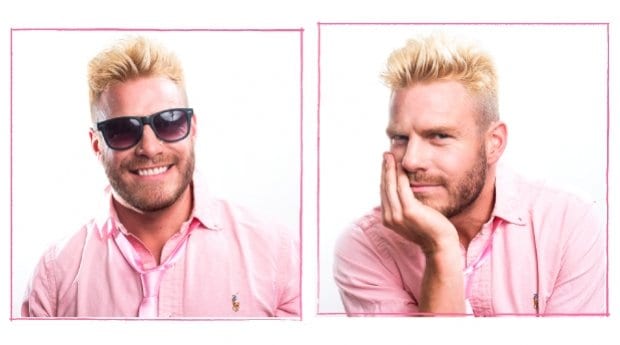Pat Mills is confident, but he wasn’t always that way.
“I was the new kid,” the filmmaker recalls. “When I moved to Toronto from Ottawa [in high school], I looked like a girl, and my name was Pat. I felt totally like a freak and I made no friends.”
But times have certainly changed. Polished and well spoken, Mills has the dizzying energy of someone on the verge of a major breakthrough. When we meet in a bar in Leslieville in mid-August, he has spent the last few weeks feverishly commuting back and forth across town, putting the finishing touches on the dark comedy Guidance, his first feature film. It is slated to premiere at the 2014 Toronto International Film Festival.
Since graduating from Ryerson University in 2002, Mills has established himself as an up-and-coming talent in the Canadian film and television industry. His short films have screened in various festivals around the world, and he has picked up a number of industry accolades for his screenwriting work, including recently winning the top prize at TIFF’s annual Pitch This! and the Best Comedy Screenplay award at the 2013 Austin Screenplay Competition.
But Guidance represents a creative leap for the filmmaker, who not only wrote and directed the film, but stars in it as well.
“In a certain regard, making this movie was an exercise in self-acceptance because I had low self-esteem as a young person,” Mills says. “I’ve always been really shy and a bit guarded — especially in the gay community. So with this project, I was like, ‘I’m going to get over all of my bullshit and expose myself completely to accept who I am as a person.’”
Guidance tells the story of a closeted former child actor who, after getting diagnosed with skin cancer, fakes his credentials in order to become a counsellor at a local high school. Trafficking in a lot of dark subject matter, the film derives much of its comedy from lead character David’s pathological immaturity and obsession with trying to recapture his supposed glory days.
As a former featured player on the 1980s Nickelodeon series You Can’t Do That on Television, Mills drew some inspiration for David from experiences in his own life.
“I created an alter ego that was based on my insecurities but that was also based on myself. I used to be a child actor. And I was really interested in the psychology of what happens to child actors after they’ve peaked professionally and … [are] stuck in the past and in their previous successes.
“You can see what happens to the kids who are groomed and told they’re going to catapult into this fame and it never happens. I mean, for every Jodie Foster there is a Dana Plato.”
Part of the lead character’s journey in the film is also confronting his sexual identity, a topic that Mills wanted to explore in a different way from how it is often handled in standard queer “coming out” narratives.
“The entire movie is about denial and self-medication, and it’s about a guy who is not comfortable with himself, but it’s not your typical coming-out story,” Mills says. “Usually in a gay film, there’s someone who’s gay and they’re not comfortable with it, and then they meet this really hot guy who brings them out, and everyone is happy. But that’s not what life is ever like.
“I wanted to tell a story about a coming-out process that wasn’t in a straight line and [is about] a guy who accepts himself through trying to help teenagers and becomes comfortable with who he is in the most zig-zaggy, fucked-up way,” he says.
In previous drafts of the script, Mills had explored David’s sexuality in relationship to gender and trans issues, although he ultimately decided to take the character in a different direction. Still, David struggles with his own anatomy and its connection to his overall identity.
“He gets terrified when men come on to him. He wants to retreat to the comfort zone of teenagers, and he wants to remove the failures in his life. And one of them is his dick.”
The filmmaker is frank when connecting this particular part of David’s journey to his own.
“I have certainly felt in my own life where I have gone through long periods of sexual drought. And there’s a point when you start to feel a bit disassociated from your dick, and you’re like, ‘Why do I have this? This is just like an exit point for my urine. I’m at the prime of my life and this is supposed to be a symbol of something bigger.’”
The filmmaker laughs. “Well, maybe not bigger.”
And although some writer-directors would be daunted by the idea of assuming the lead in their first feature, Mills says he was comfortable assuming different roles on set.
“It was easier in a lot of ways because I didn’t have to communicate what I just knew firsthand, and not everybody gets me and my sense of humour. But it was also challenging because you’re not at the monitor.”
Mills says he was able to avoid a lot of headaches through advance preparation done with his director of photography, Daniel Grant, and the executive producer on the film, Alyson Richards. Still, problems would crop up.
“That’s the nature of it. And as a performer, you shouldn’t be taking on the stresses that a director takes on because it’s going to affect your performance. And people were trying to protect me from knowing certain information before a scene. But I’m quick … and so as a director, I’d find myself being very curious and asking a lot of questions.”
And how does Mills feel about the finished project?
“I definitely have walked away with a lot of confidence. With this film, I kinda feel like I did the hardest thing. You shoot a really low-budget movie, you make it look really good for not a lot of money, and you put yourself in it; like, once you do that, you can pretty much do any kind of movie.”
He pauses. “Although maybe I’m speaking too soon and will end up going crazy.”
Check out dailyxtra.com for an exclusive interview with Pat Mills, as well as our extensive TIFF video coverage.
Guidance
Fri, Sept 5 & Sat, Sept 6
Scotiabank Theatre
259 Richmond St W
tiff.net


 Why you can trust Xtra
Why you can trust Xtra


